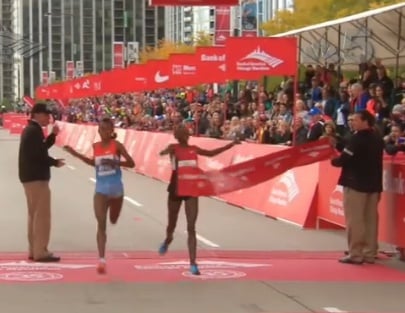All Hail Emily Sisson, Quenton Cassidy, Kenenisa Bekele, Eliud Kipchoge, And Rita Jeptoo, Find Us Some Steroids, Bad Marathon Coverage, And Proof That Road Races Are Too Expensive
The Week That Was In Running – October 6 – October 12, 2014
by LetsRun.com
October 15, 2014
Previous versions of the Week That Was can be found here. Questions? Comments? Email us.
We broke down the 2014 Bank of America Chicago Marathon in great depth as it happened. We talk a little more about Chicago below but be sure to check Monday’s homepage or our Chicago special section for full on-site coverage from the Windy City.
****
Stat Of The Week/Putting Kenenisa Bekele’s First Two Marathons In Perspective
2:08:35.5 – average time of Paul Tergat’s first two marathon finishes
2:06:27.5 – average time of Haile Gebrselassie’s first two marathon finishes
2:05:27.5 – average time of Kenenisa Bekele’s first two marathon finishes
2:04:55 – eventual world record time run by Paul Tergat (3:40.5 faster than his initial avg.)
2:03:59 – eventual world record time run by Haile Gebrselassie (2:28.5 faster than his initial avg.)
??? – ultimate PR run by Kenenisa Bekele
31 – age of Paul Tergat in his marathon debut
28 – age of Haile Gebrselassie in his debut (4 days prior to his 29th B-Day)
32 – age of Kenenisa Bekele in his debut
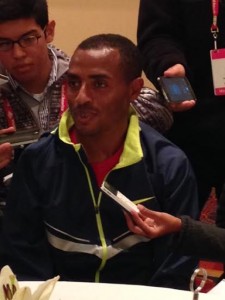 Kenenisa Bekele in Chicago
Kenenisa Bekele in Chicago
###
Bekele’s first two races certainly could have been a lot worse. Case in point: last week, road 10k world record holder Leonard Komon (26:44; also the 15k world record holder at 41:13) made his marathon debut in Eindhoven.
He came nowhere close to a 2:05:27.5 time. Komon went out in 63:04 and then totally blew up and ran 71:21 for the second half for a 2:14:25 debut.
“At 23 kilometers my legs started to feel very tired but I was determined to finish,” Komon told race organizers. “During the last hour of the race I asked myself a lot of questions. I did a lot of thinking in the final 15 kilometers as I was passing nobody other than joggers (on the first lap of the two-lap course).”
And in case you missed it, Bekele talked about the sub 2 hour marathon to LRC in Chicago. He said, “A human being can not go that (fast)” and added we’ll see a 2 hour marathon, “if the scientists create different human beings.” For more on that click here.
Runners World has a lengthy feature on what it will take for a sub 2 hour marathon.
****
Rita Jeptoo – Aging Like A Fine Wine
Rita Jeptoo is now the first human being to cross the finish line first in four straight World Marathon Majors. Her four-marathon win streak consists of the following performances:
2:26:25 – win in Boston 2013
2:19:57 – win in Chicago 2013
2:18:57 – win in Boston 2014 (course record)
2:24:35 – win in Chicago 2014
It’s worth noting that she’s almost won five majors in row. Her last loss came in Chicago in 2012 when she lost in a photo finish to Ethiopia’s Atsede Baysa.
After that race, we wrote the following about Jeptoo:
Jeptoo won the 2006 Boston Marathon, but she hadn’t broken 2:25:44 since. This was a big step up for her.
The transformation by Jeptoo is remarkable. She’s finished 19 marathons in her career and won 8 of them. But after winning the first two marathons of her career (in 2:35 and 2:28), she only won one of her next 10. She’s now won four straight and five of her last seven. Very impressive.*LRC Archives: 2012 Chicago Marathon Women’s Race
****
Eliud Kipchoge – The World Best in 2014, But Not the World #1
In our quick analysis of the Chicago men’s race, we said that given the fact that he’s the world record holder who has won three of the four career marathons that he’s finished (all majors) with a 2:04:27 average time, Dennis Kimetto “deserves to be considered the world’s #1 right now” in the marathon. We want to clarify that a little bit.
The key thing in that phrase is “right now,” as in after Berlin and Chicago but before New York.
Coming into the fall marathon season, the world #1 had to be Wilson Kipsang. He won Berlin last year in a world record and then won the world’s most elite marathon in London in a new course record. London is way harder to win than the Olympics. If Kipsang wins in New York next month, then he will still hold claim to being the world’s best.
But in comparing Kimetto to 2014 Chicago winner Eliud Kipchoge, we gave the slight edge to Kimetto as he’s got a 2:04:27 average for his first four career marathon finishes, during which he’s won three majors, as compared to Kipchoge’s 2:04:41.5 average during his first four marathons, during which he’s won three times as well but only one major.
That being said, in terms of rankings for the calendar year 2014, there is no way we’d rank Kimetto over Kipchoge for this year as Kimetto was a DNF in Boston whereas Kipchoge won Rotterdam. Thus Kipchoge will get the #1 ranking for the year 2014 unless Kipsang wins New York.
The World #1 and the World #1 in 2014 are slightly different things.
****
Two Thoughts On Running’s Coverage In The Media
Don’t believe it.
Did anyone bother to see what the actual temperature was in Paris/Chicago this year?
Weather Underground reports that at race time (7:30 a.m. CT) in Chicago on October 12, 2014, it was 46 degrees. Two hours later, it was 52 degrees.
In Paris, at race time (8:45 a.m. locally) on April 6, 2014, it was 56 degrees. Two hours later, it was 61 degrees.
So it was warmer in Paris than it was in Chicago.
*Chicago weather for October 12, 2014
*Paris weather for April 6, 2014
2) Instead of being continually disappointed about television coverage of marathons, we think moving forward it’s probably better to just assume the following when you are watching a major marathon on television – 1) The coverage will leave you wanting to pull your hair out and 2) You will not watch the major break point in the race live.
In marathoning, the key moment is the move when the lead pack breaks up. Yet it seems in every single race, the TV producers seem to find a way to miss covering that point live. It’s pretty amazing how they find a way to miss it.
It happened twice this past weekend in Chicago on the men’s side and once on the women’s side. As we said, in our recap, “There is no denying that the television coverage of the men’s elite race was pretty awful.” We know of LRCers who wrote NBC Chicago complaining of the coverage.
They are very creative in finding ways to miss the break – sometimes they’ll be on commercial, sometimes they’ll be showing the wheelchair racers crossing the finish, sometimes they’ll be interviewing the women’s winner, sometimes they’ll be giving a weather report, sometimes they’ll be interviewing a fan and sometimes they’ll be having technical difficulties. All of those reasons are unacceptable. If you are doing an interview or weather report, show a split screen. If you are having technical difficulties, use a cell phone to talk to someone in the press truck.
TV producers who have no clue about running, let us try to explain this to you using an analogy from a sport that hopefully you understand – baseball. Seeing the runner cross the finish line is nice. We get it – it’s a nice visual. But 9 times out of 10, it’s irrelevant. It’s like watching a home run hitter cross home plate. We want to see the point where the hitter hits the home run – we want to see the point where the runner wins the race and that’s when they make the break.
Speaking of live marathon coverage, does anyone have a DVD of last year’ New York City Marathon coverage on ESPN (or know if it’s available on WatchESPN)? If so, please email us as we wanted to review it to see if even they got it right but didn’t watch it as it wasn’t shown in the press room.
If anyone is going to get it right it is ESPN.
****
Take Steroids Now – Benefits Last Years Into The Future
It will be interesting to see whether the study that showed steroids have a very long impact on mice, perhaps lifelong, even if they aren’t taking them any more is proven to be the case in humans.
In case you didn’t read it, research by University of Oslo scientists on mice has shown that steroids continue to help mice long after they stop taking the drugs. Kristian Gundersen, a professor at the University of Oslo who conducted the research told BBC Sport: “I think it is likely that effects could be lifelong or at least lasting decades in humans. Our data indicates the exclusion time of two years is far too short. Even four years is too short.”
At first, we weren’t sure what to think about the study. Once we spent half a day thinking about it, the study actually brightened our mood for two reasons.
1) It will increase the call for lifetime bans for intentional* doping. There is ZERO excuse for intentional doping and we’ve always felt it should result in a lifetime ban. If the effects of steroids are proven to be lifelong, then those in charge of the anti-doping movement will agree with us.
2) It made us feel better about some of the current stars in track and field actually being clean. Logically, we know many fans wonder how Justin Gatlin could be running faster now than when he was part of Trevor Graham‘s doping machine. They thus assume he’s doping. And if that’s true, it’s an indictment on the current state of drug testing as he’s passing test after test. But if he’s still benefiting from his past drug usage, then it’s conceivable he’s clean right now and it’s a boost to the current drug testing process.
*Yes, we know intent isn’t easy to prove so we’re fine with a 2- or 4-year ban if it’s possible the doping was unintentional. But some substances can’t get into your body accidentally, and lots of doping cases (Marion Jones, Lance Armstrong, Biogensis) are the result of testimony/evidence where it’s clear the doping wasn’t the result of contaminated food.
More: Drug cheats in sport could benefit ‘for decades’, scientists find.
****
Performance Of The Week That Few Noticed/A Super-Fast Women’s 10k
Ok people, now it’s time for the performance of the week that no one noticed.
Come on people. What do you think it was?
We’d have to say it was 23-year-old American Emily Sisson’s 31:57 road 10k at the Tufts Health Plan 10K for Women in Boston, a race which was won by Jordan Hasay in 31:39.
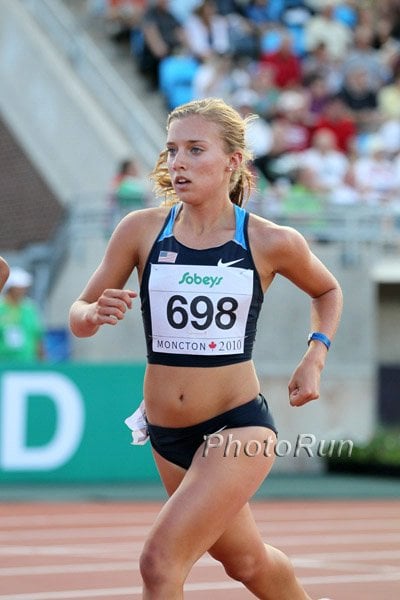 Emily Sisson at 2010 World Juniors
Emily Sisson at 2010 World Juniors
Sisson, who ran 15:48.91 for 5,000 in high school (a U.S. HS record since broken by Mary Cain), is in her final year at Providence, where she doesn’t have cross country eligibility. Sisson has had a good collegiate career but she’s never contended for an NCAA individual title. So far, her best finishes at NCAAs have been a sixth place outdoors in the 5000 (2013), 7th place in cross country (2013) and eight place indoors in the 5000 (2014). Those are good results, but the 31:57 mark indicates she’s capable of contending for and possibly winning an NCAA title on the track in 2015.
Consider this.
Jordan Hasay graduated college with a 32:20 10,000 pb.
32:20 is also the 10,000 pb of reigning NCAA champ Emma Bates of Boise State.
Sisson has run 23 seconds faster than that – on the road.
That being said, it’s worth pointing out that a number of women in Boston ran outright lifetime PBs (road or track) on the loop course. We’re not saying the course was short – but it was certainly unusual how many women set lifetime PBs, on the road and in October. At a minimum, the conditions must have been totally optimal for running fast as shown by the chart below.
| Runner | Time | Previous PB | Improvement |
| 1. Jordan Hasay | 31:39 | 31:39 | 0 |
| 2. Caroline Rotich | 31:41 | 32:43 | 62 |
| 3. Risper Gesabwa | 31:48 | 31:43 | NA |
| 4. Azmera Gebru | 31:50 | 32:06 | 16 |
| 5. Emily Sisson | 31:57 | 32:31 | 34 |
| 6. Emily Infeld | 32:03 | 31:47 | NA |
| 7. Janet Bawcom | 32:12 | 31:12 | NA |
| 8. Sara Hall | 32:14 | 32:28 | 14 |
| 9. Katie Matthews | 32:23 | 32:44 | 21 |
| 10.Gotytom Gebreslase | 32:30 | 31:51 | NA |
In the same race, three-time US Olympian Jen Rhines, age 40, ran 32:33 to set a new US masters mark, smashing Colleen De Reuck‘s 10-year-old mark of 32:50.
###
Speaking of masters records, it’s worth noting that Britain’s Helen Clitheroe, 40, set a world masters best of 20:39 at the Four Miles of Groningen in the Netherlands, according to David Monti (the IAAF does not ratify world records at 4 miles, but ARRS does).
****
Results Of Note That Didn’t Make the Home Page
With our coverage of Chicago taking up most of the prime real estate on the homepage, a few things didn’t get up there that we’ll talk about now.
At the Hannaford Half-Marathon in New York, former NCAA Cross Country champion Josh McDougal, 29, returned to the winner’s circle as he won the men’s half-marathon in a modest 67:43. In the accompanying Mohawk Hudson River Marathon, 29-year-old Jodie Robertson had a huge pb. The 2012 US Olympic Trials participant went in with a 2:42:31 pb and left with a 2:32:22 pb thanks to her dominating 20+ minute victory in a race where she also beat the course record by more than 13 minutes.
More: MB: Jodie Robertson – 2:34:21 at Mohawk Hudson Marathon
###
Former steeple star Bouabdellah Tahri lowered his marathon pb from 2:18:16 to 2:16:28 to claim the French national championship in the marathon last week (he was third overall as two Africans beat him). The 35-year-old won bronze in the steeple at Worlds in 2009 and five other times has finished top five in the world in the event.
###
Weini Kelati, the girl who was 8th at World Juniors for Eritrea but now is going to HS in Virginia, had a nice win last weekend as she won the girls’ Eastern States race at the Manhattan Invitational at Van Cortlandt Park in 14:20.6 – 4.1 seconds ahead of Fayetteville-Manlius’ Annika Avera, who was 20th at NXN last year.
It’s worth noting that Kelati’s winning time wasn’t the fastest of the day as 10th-grader Jessica Lawson of Corning Painted Post ran 14:18.8 in the Varsity C race.
****
Quenton Cassidy Wins
Josh McDougal wasn’t the only runner last week to break a long winless streak.
Last week, the announcer at the NU Hartford Marathon, Half-Marathon and 5k announced the winner of the 5k race in 15:29 as follows:
“And in 1st place and our 5k Champion…. Quenton Cassidy”
Cassidy is of course is a fictional character in John L. Parker‘s Once A Runner. In reality, the winner was former New Paltz runner Joe Gentsch who entered the race under the name “Quenton Cassidy.”
We loved Gentsch’s blog – http://rungentschrun.tumblr.com/ – where he describes the thrill of hearing Quenton Cassidy announced on the loud speaker.
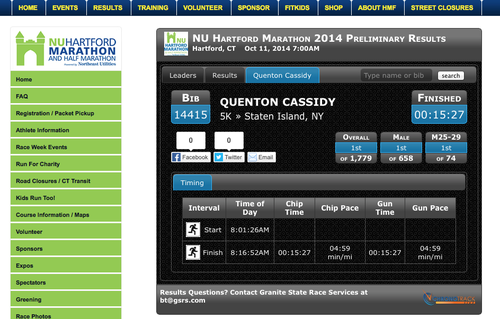 |
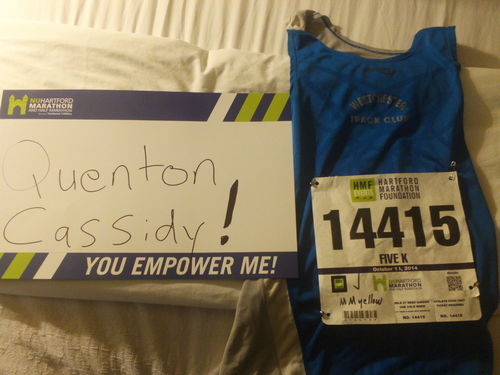 |
We also loved his ‘About me’ section where he described how miserable he was when he gave up running shortly after college:
I slowly, built up my resume and landed a job that I utterly hated. 2-4 hours a day of commuting, followed by non-stop, daunting, never ending, accounting work for 8+ hours. 50 hours a week…My life was consumed. I was heading down the wrong path and I knew it. Every morning, I would wake up and say to myself “FUUUUCK” because my life sucked. Staring out the express bus in traffic watching people run. Thinking “isn’t that what I am supposed to be doing?”
Something had to give.
But then I decided to do something about it, I moved back to New Paltz, landed a part time job with flexible hours, and took a pay cut to chase after my fleeting (running) dreams. I left my distractions behind along with my excuses. I moved in with my teammate and best friend, who is also a professional runner. I put myself back in the driver seat and took control of my life.
Now I wake up every morning and say two things:
- “Today I will train to be the best athlete in the world“
- “I will break 4 in the mile, no if’s and’s or buts. It will happen. I deserve and expect this I have 100% belief in myself, my coach, my training, and my legs. Believe it, and it will happen. I believe”
More: Joe Gentsch’s Blog
****
Think Road Races in the US Are Expensive? Try Kenya
Do you think there are too many road races and that they are too expensive? We’ll you’ve got some company.
Many people think there are too many road races and they are too expensive – even in Kenya.
Except in Kenya they complain when there are three or four in a weekend in a country of 44 million people and if they cost more than $11.
Many a times we have had three or four road races in different parts of the country in one weekend, leaving most of us wondering if there is any co-ordination at all.
Even worse is the fact that people are using these races for their own selfish interests in the guise that they are funding certain projects. Slowly, road races are being turned into business ventures with some quarters making a kill.
For example, registration fee of ($5.61) Sh500 or ($11.22) Sh1,000 for around 1,000 athletes is not small money. This is besides the fact that these races are getting full sponsorship.
That quote comes from a column witten by Barnabas Kori in The Nation.
$11.22 may not sound like much but considering that the per-capita GDP of Kenya is just $994.31 (in the U.S., it’s $53,142.89), in relative terms, one could argue the $11.22 entry fee is the equivalent of $599.68 in the U.S.
More: Unchecked road races ruining sport runners
****
4 Quotes of The Week (that weren’t quote of the day)
I
“In the future maybe (someone can go sub-2 in the marathon), if the scientists create different human beings… A human being can not go that (fast),”
– Kenenisa Bekele giving the ultimate endorsement to those of us in the “we’re not going to see a sub-2 hour marathon” on a legitimate course any time soon. LetsRun.com’s official position is definitely not before 2050.
More: Kenenisa Bekele on the 2 Hour Marathon: “A human being can not go that (fast)”
II
“They are such good friends that they realise that trying to beat each other in workouts is pointless. There’s only been three or four times when I’ve been coaching them that I’ve seen them wrongly start to race each other.
“Believe me, I take them to one side and speak to them and tell them, ‘Hey, that’s not what we are about here.’”
– Alberto Salazar talking to Athletics Weekly about Mo Farah and Galen Rupp.
More: A workshop with Alberto Salazar
III
“But like it has happened to thousands of other runners, in thousands of other marathons, at around 32km the pace began taking its toll. We backed off briefly in attempts to regroup. Just as that was happening a train of Ethiopian women came streaming by. For a lot of runners this would be pretty demoralizing- Shalane was already in her own little world of hurt, then these ladies just show up and float on by. This is when Shalane showed just why she is one of the best in the world. She kept completely calm and focused, she didn’t flinch. She waited, regrouped and then she dug the hell down! she began to fight back! (I have no idea where this strength came from, when this happens to me I usually start whimpering and drooling on myself.)”
-Canadian marathoner Rob Watson, blogging about how impressed he was with Shalane Flanagan’s competitiveness when he was pacing her in Berlin. Ironically, Flanagan herself later blamed this competitveness on her blowup during the final 2km as she’d vowed to herself she’d just try to save energy and grind out a time but instead couldn’t stop herself from ‘wasting’ energy trying to compete.
More: Canadian Marathoner Rob Watson Blogs About Pacing Shalane Flanagan In Berlin
IV
“Those (9.77 and 19.71 on the same day) are incredible performances. Not many people have run that fast separately, ever. To do it on a damp Friday night? I couldn’t believe those times.
“It shows one of two things: either he’s still taking performance-enhancing drugs to get the best out of him at his advanced age, or the ones he did take are still doing a fantastic job.
“Because there is no way he can still be running that well at this late point in his career.”
– British 400-meter hurdler Dai Greene talking about Justin Gatlin to the BBC.
More: Drug cheats in sport could benefit ‘for decades’, scientists find.
****
Stat of the Week II
Zero – number of top 10 finishers at the 2014 Japanese Corporate Track and Field Championships that were born in Japan. The top 9 in the fast heat (heat 3) were all from Kenya or Ethiopia (7 Kenya, 2 Ethiopia) and a runner in the slow heat (heat 1) ran 28:23.59 to edge the 10th place finisher in the fast heat:
2014 Japanese Corporate Track and Field Championships Men’s 10,000 Results
1. Paul Tanui (KEN), 27:17.82
2. Leonard Barsoton (KEN), 27:20.74
3. Patrick Muwaka (KEN), 27:37.67
4. Joseph Kamais (KEN), 27:38.18
5. Paul Kuira (KEN), 27:40.43
6. Agato Yashin Hassan (ETH), 27:51.72
7. Meraku Abera (ETH), 27:52.42
8. William Malel (KEN), 28:00.75
9. James Mwangi (KEN), 28:09.42
10. Macharia Ndirangu (KEN), 28:23.59*
11. Tsubasa Hayakawa (Japan), 28:23.64
*Run from heat 1, all other times from heat 3.
****
Recommended Reads
Canadian Marathoner Rob Watson Blogs About Pacing Shalane Flanagan In Berlin
LRC Great New Running Film, Transcend, Debuts
Spikes Mag Takes A Look At The Amazing Life Of Alfred Gilbert – The Man Who Invented The Pole Vault Box If you like this man who helped save Xmas in America, then read this piece on him from 2012.
****
Quotes Of The Day & Last Week’s Homepages:
Note: To see a particular day’s homepage, click on the hyperlink of the date. The hyperlink below the date on the quotes will take you to that particular article – not that day’s homepage.
– Eliud Kipchoge, winner of Sunday’s BofA Chicago Marathon in 2:04:11. Kipchoge is not only a superstar marathoner, but a great ambassador for the sport.
– Eliud Kipchoge talking prior to Sunday’s Bank of America Chicago Marathon, where he’ll take on a slew of super-talented runners including Kenenisa Bekele, whom he stunned 11 years ago at Worlds in the 5,000. Will history repeat itself in Chicago?
– Excerpt from our article on what shoes the pros at the 2014 Chicago Marathon are racing in on Sunday.
– Bank of America Illinois President Tim Maloney, talking about Carey Pinkowski, who is celebrating his 25th year as race director of the Chicago Marathon. The year before Pinkowski took over (1989), the race only had 7,269 starters. This year it should have 39-40,000 and a world class field.
– Deena Kastor talking in a Phil Hersh / Chicago Tribune article about how the 2:15:25 women’s marathon world record is totally untouchable yet the men’s gets broken regularly. Kastor should know as she broke the US record in the London 2003 race where Paula set the WR but finished nearly 6 minutes back. Trivia fact: Paula set her first WR in Chicago in 2002 with some help from LetsRun.com.
– Eliud Kipchoge, who will be racing world 5,000 and 10,000 record holder Kenenisa Bekele in the 2014 Bank of America Chicago Marathon this weekend. Kipchoge says he thinks he can PR, which is big as his best is 2:04:05.
– 2014 US Marathon champion Tyler Pennel talking about his thoughts ahead of and during his marathon debut. Pennel won with 2:13:32, running big negative splits of 1:07:48 and 1:05:44.
Questions? Comments? Email us.

